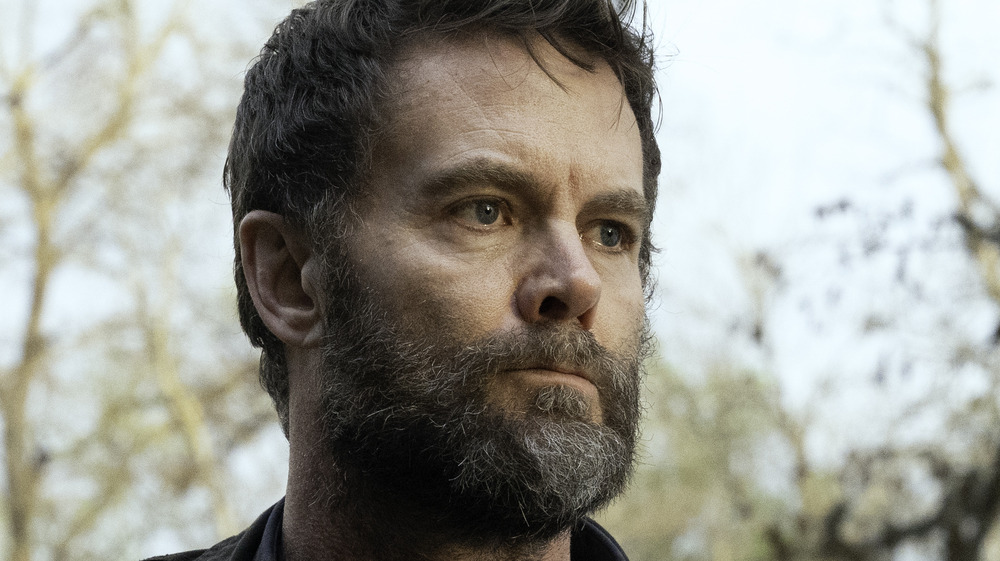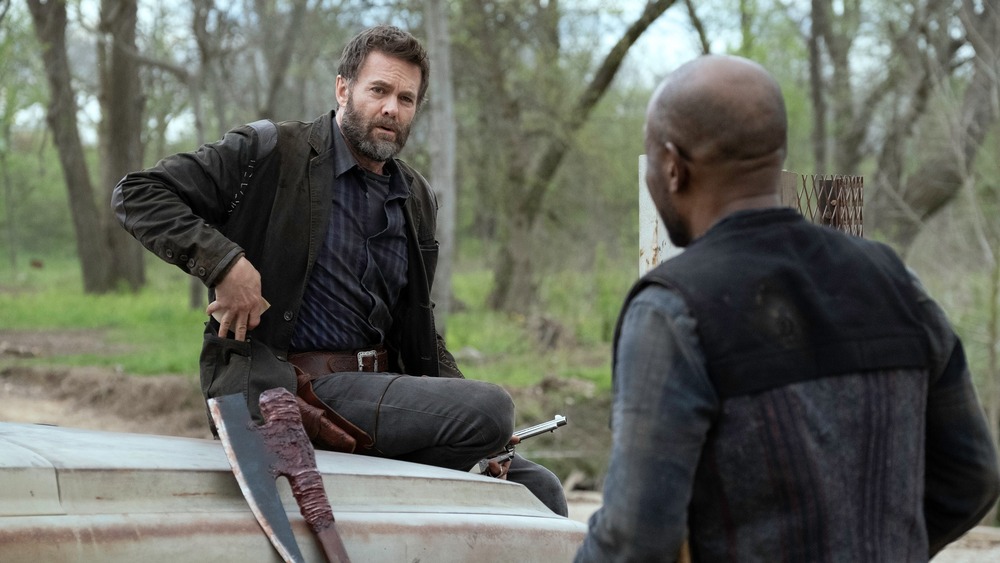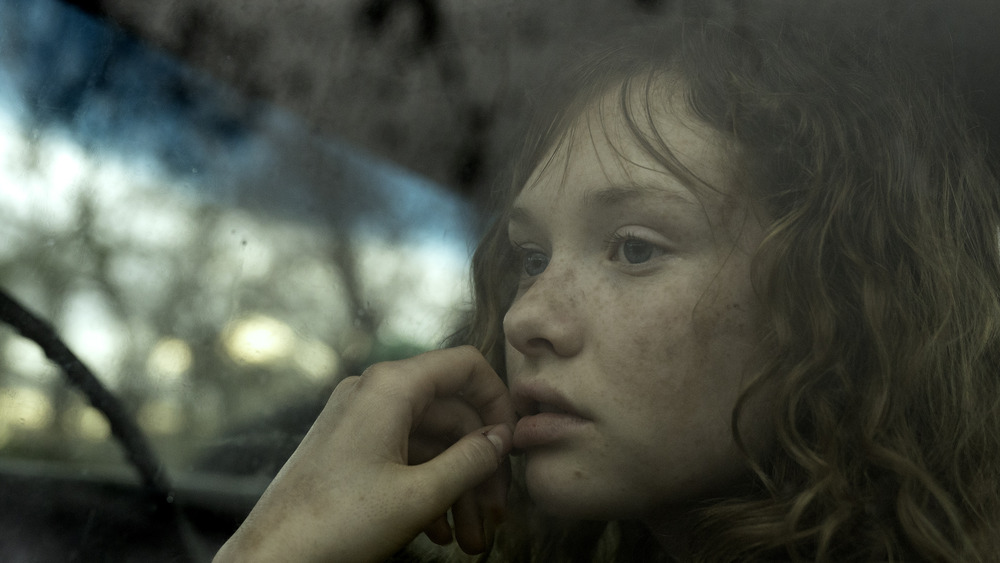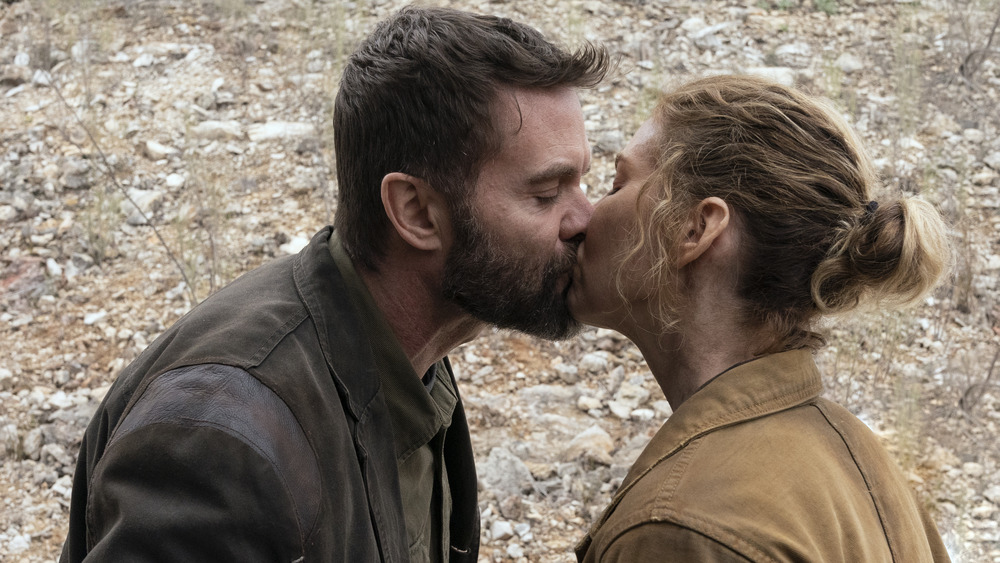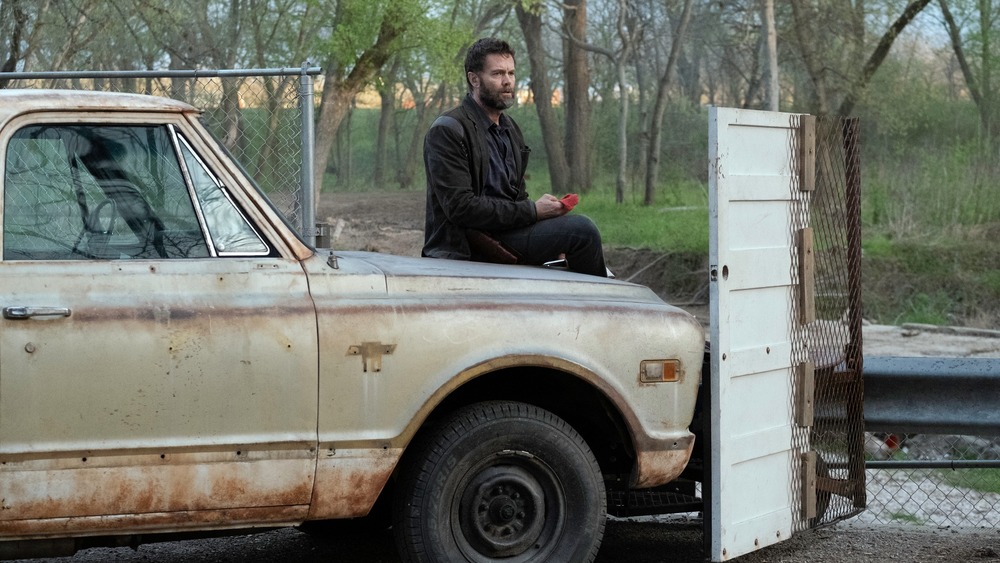Fear The Walking Dead 'The Door' Ending Explained
Contains spoilers for Fear the Walking Dead season 6, episode 8 — "The Door"
Fear the Walking Dead returned from its pandemic-mandated hiatus with the episode that was supposed to be the midseason finale, "The Door." You can tell that season 6, episode 8 was meant to be a finale, because it contains Fear's most consequential death since Madison (Kim Dickens) burned up at the baseball diamond (or at least we think) back in season 4. It's a heartbreaking end for one of the show's most beloved characters, and the kind of emotionally gutting death at which the Walking Dead franchise excels. But more on that death later.
"The Door” is a sequel of sorts to season 6, episode 4, "The Key," which focuses on John Dorie (Garret Dillahunt). It's important to remember what happens in "The Key” in order to understand "The Door." Episode 4 finds John working as a Ranger for the ruthless community leader Virginia (Colby Minifie). John, who had been a cop before the apocalypse, investigates the death of a fellow ranger named Cameron (Noah Khlye), whom Ginny says died accidentally but John proves was murdered. Ginny frames Cameron's girlfriend Janis (Holly Curran), who's executed via walker. John knows she was innocent, and whomever slit Cameron's throat with a knife taken from Lawton's armory is still out there.
John can't live with such compromised morality, sacrificing justice for the status quo, and in episode 6, he flees Lawton to go live alone in his cabin in Texas (previously seen in the season 4 episode "Laura," one of Fear's finest hours) because his wife June (Jenna Elfman) chooses to not go with him.
Let's break down what happens in Fear the Walking Dead season 6, episode 8, and explain what it all means.
"I'm not meant to live in this world."
When we catch up with John at the beginning of "The Door," he's hiding out in his cabin, haunted by his inability to get justice for Cameron and Janis and all of the other times he's come up short in his life and been just like his dad, who abandoned his family when John was young. At this point, he's ready to die.
By chance, John meets up with Ginny's tween sister Dakota (Zoe Colletti) and Morgan (Lennie James), who are on the run from Ginny and the Rangers. They try to persuade John to come with them and rejoin the world of the living. John can help keep Dakota from becoming a self-interested nihilist like her sister, they tell him, and be the man to June that his absent father wasn't to him. Morgan reminds him that John once saved his life and became his brother, and that's who John really is — not this man hiding from the world. It's not too late for him to start over.
John helps Dakota and Morgan clear a bridge overrun by walkers so they can continue on to the new community Morgan is building. But when Dakota stabs a walker, John realizes she's holding the knife that was used to kill Cameron. The fans who suspected Dakota was the killer were vindicated. She killed the ranger because he told Ginny she had been sneaking out of Lawton. It wasn't worth murdering him over, but Dakota will kill anyone who interferes with her getting anything she wants. Dakota doesn't believe that John won't tell anyone she's a murderer, so she shoots him in the chest and pushes him off the bridge into the river below.
Dakota's secret revealed, and Morgan's conversation with Dwight
John sinks to the bottom of the river. Bleeding profusely, he sees a photo he was carrying — one of himself as a child with his father — and resolves to keep living, for June and the other people he loves and the future. He swims up, and with the last of his strength, pulls himself onto a piece of wood floating in the river. "It's not too late," John says.
Morgan comes back from a walk and sees what happened. Dakota reveals to him that she's the one who saved him after Ginny left him for dead at the end of season 5. She wrote the note that inspired him by telling him he still had things left to do. And that thing left to do is kill her sister. "You're not breathing because you have some silly little paradise that you have to build," Dakota says. "You are breathing because you're the only person left that can end her." Dakota kept Morgan alive so that she could cash in a debt when the time was right: a life for a life.
Meanwhile, Ginny, June, and some Rangers arrive at John's cabin. Morgan radios to them that John's been hurt, and they need to help him if they see him. He then radios to Dwight (Austin Amelio) to prepare the new place for battle because he thinks it's going to come to their door; Morgan also asks Dwight to get his wife Sherry (Christine Evangelista) and her people to fight as well because they're going to need all the help they can get. This brief exchange, more than any other in the episode, is setting up the second half of Fear the Walking Dead season 6, which will find the people who have been separated throughout the first half coming back together to defend their new home against the tyrannical Ginny.
The deeper meaning behind John's death
Back at the cabin, John washes up on the riverbank, just like the walkers at the beginning of the episode. June runs out with her first aid kit to help him. After a moment where it seems like he might be gasping for air and pushing himself up, it's revealed that John has already died and turned. He crawls toward June, and she puts him down. It's an absolutely tragic end for one of Fear's greatest characters, especially because that moment where it seems like it might not be too late for him ends up being false hope.
The theme of the episode is encapsulated with John's death: It's about the difficulty of trying to move on from the past and not repeating it. John ran away from his problems, responsibilities, and family just like his father did — and just like he himself had before. He had abandoned being the good man who helped Morgan come back to the land of the living when Morgan was lost in the wilderness, and he was ready to give up on life. But Morgan's clear-eyed kindness and tough love in this episode is able to remind John of who he really is. Facing death also helped John realize who he's really supposed to be. But tragically, he doesn't get that second chance. He tries to get back to June and redeem himself, but he doesn't make it.
Where does Fear the Walking Dead go from here?
John's passing is the darkest death Fear the Walking Dead has had in a long time: One of its most heroic characters doesn't get a heroic death. It was a surprise for John and for us, the audience, and he doesn't receive the opportunity to atone for his mistakes before he dies. It wouldn't be a stretch to say this isn't how anyone would have expected John to go out.
And yet, even though his death wasn't a heroic act of sacrifice, Fear fans still love John and think he was a good man. Audiences know that he was trying to do the right thing in the end, but the other characters on the show don't. The real John Dorie wasn't the one hiding in his cabin, waiting to die. The real John Dorie was the one who helped and protected people. We got to see the fleeting return of that man in his last moments, and it's a shame that June didn't get to see that too.
It will be interesting to see where Fear the Walking Dead goes without John Dorie, its heart and soul for the past two and a half seasons. His death will surely have a galvanizing effect on the other survivors, who will try to seek justice the way John so doggedly did. But it may not have been a wise decision to kill off a fan-favorite character when the cast is packed with characters whose stories don't seem to have as much of a future. (Really, are they ever going to figure out what to do with Danay Garcia's Luciana?) Could the writers have sacrificed long-term storytelling potential for a short-term jolt? Will fans be convinced by John's sudden turn toward gloom, or will they argue it felt like a two-episode out-of-character arc that happened because the show needed a death?
In any case, "The Door" will go down in history as one of Fear the Walking Dead's most memorable episodes — for better or for worse.
